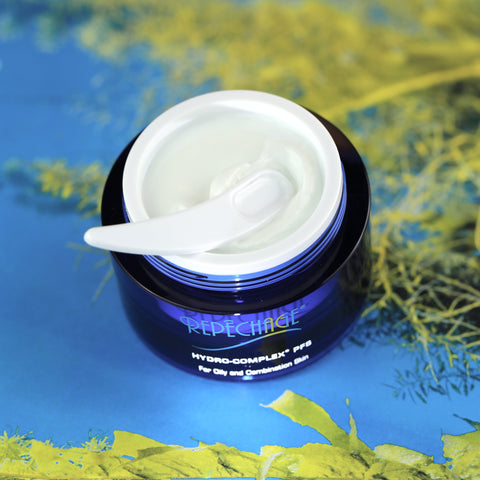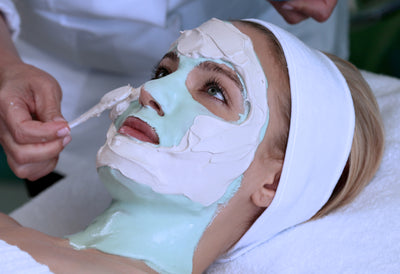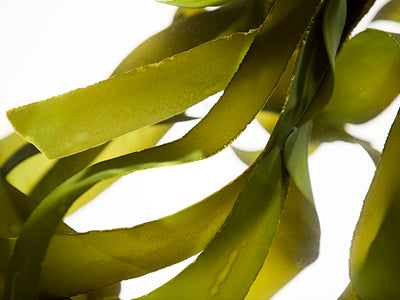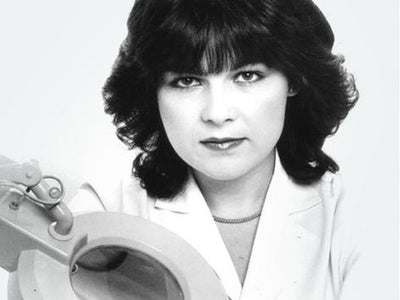Ingredient Spotlight: Hyaluronic Acid

Hyaluronic Acid has been trending in skin care over the past few years, and for good reason. This natural moisturizing polysaccharide in prevalently found in the skin, and is known to hold up to 1000X its weight in water, making it the perfect ingredient to help restore moisture to the skin barrier.
But while Hyaluronic Acid has been trending, it has actually been formulated into skin care for decades, and is known to be both safe and effective. Today, there are new forms of this trusty ingredient that work together with ingredients such as Seaweed extracts, advanced Peptides, Adenosine, Niacinamide and Camellia Sativa Seed Oil to help restore the skin’s essential moisture barrier while helping reduce the appearance of fine lines and wrinkles.


But this heavy-hitter ingredient isn’t just for mature skin. Many skin types, including dry, compromised and even sensitive skin, can benefit from Hyaluronic Acid’s moisturizing properties.
Here, we’ll take a close look at this super-hero ingredient and show how to easily incorporate it into your skin care routine.
What is Hyaluronic Acid?
Hyaluronan (HA) is a polysaccharide produced by almost all members of the animal kingdom, composed of forms of sugar acids. They are based on cellobiose (the building blocks of cellulose) as well as other components such as keratin sulfates.

50% of the Hyaluronic Acid found in the human body is found in the skin. Hyaluronic Acid is known to help keep skin moisturized, repair skin tissue, transport nutrients in the blood to skin cells, serve as a cushion to lubricate and protect against damage, and contribute to the resilience and suppleness of the skin.
Hyaluronic Acid is a humectant, a substance that attracts water. The hydration of the skin and the epidermal moisture barrier depend on the amount of Hyaluronic Acid in the dermis. But, as the body ages, Hyaluronic Acid decreases, leading to loss of moisture and elasticity, and contributing to the formation of lines and wrinkles. Furthermore, production of Hyaluronic Acid has been found to significantly decrease when exposed to UV light.

One of the skin’s most important functions is to retain water without letting it escape into the environment. Skin itself is between 50% and 75% water, with the deeper tissues of the skin comprised of large cells loaded with moisture. There is a moisture differential of 80% at the lower layers and 15% at the upper layers. With such a great difference, there will be a natural tendency for the moisture to move from the lower layers to the upper layers through osmosis to create a movement is called trans-epidermal moisture loss (TEWL)—a movement of moisture from the deeper layers of the epidermis, where it is highly concentrated, to the more superficial regions of the epidermis, where it is less concentrated.
When the stratum corneum is intact and healthy, it serves as an effective barrier to inhibit evaporation. If the cells are packed tightly together, TEWL cannot occur, but if the cells are loosely packed and flaking, the moisture can easily evaporate. Skin that has been compromised by environmental aggressors such as pollution and UV light, as well as overly-aggressive skin treatments such as microdermabrasion and chemical peels can also reduce the skin’s moisture barrier.
Formulating with Hyaluronic Acid
For use as a cosmetic ingredient, Hyaluronic Acid is manufactured in the lab through biofermentation. There are different forms of Hyaluronic Acid used in cosmetic formulation, including Sodium Hyaluronate and Hydrolyzed Sodium Hyaluronate. In general, Sodium Hyaluronate, the most common form, is used in moisturizing creams to help increase the moisture in the skin barrier. With this, skin is plumped and the appearance of wrinkles is greatly diminished. Hydrolyzed Sodium Hyaluronate has a lower molecular weight than Sodium Hyaluronate, so can penetrate deeper into the skin surface.

Chemists use the higher weight Sodium Hyaluronate to reduce Trans-Epidermal Water Loss (TEWL) by helping to form a moisture barrier on the surface of the skin. It is for this reason you will find this ingredient in moisturizers that are specifically formulated to help restore the moisture barrier, such as Hydra Dew Pure™ Facial Moisturizer. This combines Hyaluronic Acid with the nurturing benefits of Laminaria Digitata Extract, a natural source of 12 vitamins,18 amino acids and 42 trace elements, and Camellia Japonica Seed Oil, an ingredient used for centuries in Japan to help prevent moisture loss and help strengthen the protective skin barrier.
For normal skin, Hydro-Complex® PFS Moisturizing Cream For Normal to Dry Skin combines Hyaluronic Acid with Niacinamide/Vitamin B3, an ingredient known to help moisturize and soothe all skin types.

Sensitive skin can benefit from Hyaluronic Acid when combined Seaweed extracts and soothing and antioxidant ingredients such as Mirabalis Jalapa, such as you will find in the Red-Out® Soothing Sheet Mask as well as combined with Micro Silver, Quercetin and Rutin found in Red-Out® Serum.

Formulating with two forms of Hyaluronic Acid—Sodium Hyaluronate and Hydrolyzed Sodium Hyaluronate— is particularly beneficial for mature skin to help combat signs of aging. This works synergistically to create a moisture barrier on the skin surface with the larger molecules, while the smaller molecular weight penetrate a bit more deeply into the superficial skin layers. These two forms of Hyaluronic Acid are found in super skin elixirs such as Vita Cura® B3 Elixir Complex, which also includes Seaweed extracts, Niacinamide B3, Adenosine and advanced Peptides.
Through its many applications in all forms of skin care, Hyaluronic Acid is both versatile and effective. Try one of the many formulations and see for yourself!
Have any skin care ingredients you want to learn more about? Let us know in the comments.








